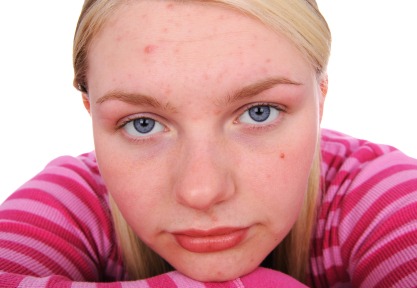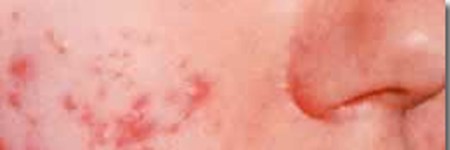Acne

Definition
Acne is a chronic inflammatory condition resulting
in pustular skin eruptions (pimples) which occur most commonly on
the face, neck, shoulders and upper back.
Description
Acne is caused by a blockage at the opening of the
sebaceous (oil-producing) glands in the skin. These glands normally
produce an oily substance called sebum which is required to keep
the skin supple and healthy. Puberty causes these glands to produce
excess oil. At the same time, the dead skin cells lining the skin
pores are not shed properly and clog up the follicles. These two
effects result in a build-up of oil-producing whiteheads and
blackheads (where a darkened plug of oil is visible). This build-up
of oil creates an ideal environment for bateria to multiply. This
triggers inflammation and the formation of red or pus-filled spots.
See the Acne – causes topic for more information.
Treatment Options
As with all conditions your Doctor should be
consulted to diagnose and treat this condition. Sometimes your
Doctor may prescribe an antibiotic. If the case is severe there are
other treatments available from your Doctor. See the Acne
management topic for further information.
Diet Hints
See the Acne Diet on the Healthpoint.
Vitamins / Minerals / Herbs
Vitamins may be of assistance if dietary intake is
inadequate.
Ask your Pharmacist for advice.
• Zinc supplementation, in combination with other therapies, has
been shown to improve Acne in some cases.
• Zinc combined with Vitamin B3 (also known as
nicotinamide, niacin or nicotinic acid) and Folic acid helps to
manage Acne.
• Vitamin A, as a supplement or in skin
preparations, plays an important role in the treatment of Acne.
Vitamin A is not suitable for pregnant women.
• Calendula is used widely as a soothing
ingredient in skin preparations. It has anti-inflammatory,
antiseptic and wound-healing properties.
• Sarsaparilla and Gotu kola, taken orally,
have anti-inflammatory properties that may help to improve
Acne.
• Tea tree oil has been shown to be an
effective treatment in skin preparations for Acne.
Aromatherapy
The listed essential oils are suggested for the
health management of Acne. The most specific oils are shown in
capitals.
BERGAMOT, cedarwood, GERANIUM, juniper, LAVENDER, petitgrain,
rosewood, TEA TREE, ylang ylang.
Application
DIRECT: Blend any single listed essential oil or combination of
several essential oils – 5 drops (total) to 10mL (1/3 fl oz)
vegetable carrier oil such as sweet almond, apricot kernel, jojoba,
wheat germ. After cleansing, apply topically to acne affected
area.
Pharmacist’s Advice
-
Follow the Diet Hints.
-
Drink at least 6 to 8 glasses of fresh water a
day. This helps prevent dehydration and constipation that may be
associated with acne. Water is thought to help with cleansing of
the body. Filtered water is preferable.
Consider using a special water Filter Jug. -
Cleanse the skin thoroughly with a medicated face
wash recommended by your Pharmacist. A special Acne product
containing Benzoyl Peroxide might be
suggested to apply after cleansing the skin. Ask your Pharmacist
for advice. There are many brands and they are available as a soap,
liquid or a foam. Always pat the affected area dry rather than
vigorously rubbing. -
Include yoghurt or some acidophilus in the diet.
Acidophilus can be useful in establishing a healthy internal flora
and promoting the bowels to eliminate properly. -
Some cosmetic products may aggravate the
condition, especially those that contain certain ingredients such
as isopropyl myristate. Non-greasy, water-based products are best.
Some products use the description ‘non-comedogenic’ or
‘non-acnegenic’. This means the products have been tested and shown
not to worsen Acne. -
If the diet is inadequate consider some
supplements. The B Group Vitamins may be helpful for stress. Stress
tends to deplete B vitamins and stress is often associated with
Acne. Zinc is suggested because it is reputed to help the immune
system. Vitamin A is useful for a number of skin conditions
including Acne. -
Apply topical preparations to the area involved,
not just to individual lesions. -
Sunlight may aggravate irritation caused by
topical applications (i.e. retinoids), therefore these need to be
applied at night.

